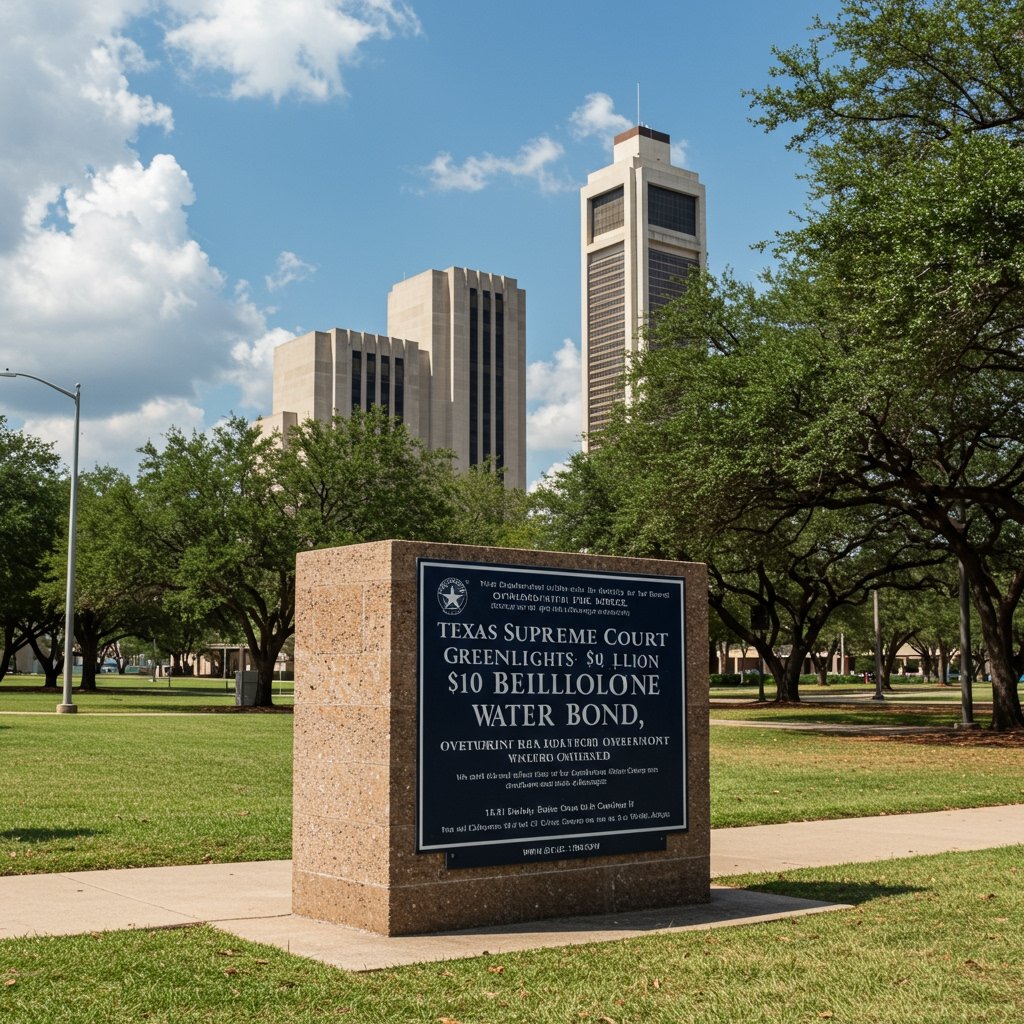Texas Supreme Court Unanimously Upholds Proposition A Water Bond Legality
Austin, Texas – In a significant ruling today, the Texas Supreme Court has unanimously upheld the legality of statewide water infrastructure bonds authorized by Proposition A, a measure overwhelmingly approved by Texas voters in the November 2024 election. The high court’s decision, issued from its Austin chambers, effectively overturns a prior ruling by a lower court that had questioned and challenged the bond’s constitutional basis. This legal challenge stemmed from a lawsuit originally filed by a coalition comprising environmental groups and concerned residents of Denton County.
The nine-justice court’s definitive 9-0 decision clears the critical path for the State of Texas to move forward with the issuance of up to $10 billion in bonds. These substantial funds are specifically earmarked for funding critical water supply and treatment projects urgently needed across the vast and growing state of Texas. The ruling is widely anticipated to accelerate the planning and construction phases of these essential projects, potentially influencing water availability and associated costs in numerous regions across the state by as early as 2026.
Background on Proposition A
Proposition A was presented to Texas voters on the ballot during the November 2024 general election. The measure proposed the creation of a dedicated fund and the authorization of state general obligation bonds totaling up to $10 billion. The explicit purpose of this funding mechanism was to provide financial assistance, primarily in the form of low-interest loans and grants, for projects aimed at developing and improving Texas’s aging and strained water infrastructure. This includes initiatives focused on securing future water supplies, repairing leaky distribution systems, building new reservoirs, implementing water conservation measures, and upgrading municipal water treatment facilities.
The proposition garnered strong support from a diverse range of stakeholders, including state and local officials, business leaders, and various community groups who emphasized the critical need to address Texas’s projected water shortages driven by rapid population growth and the increasing frequency and intensity of drought cycles. Voters ultimately approved Proposition A by a considerable margin, signaling a clear public mandate for significant investment in the state’s water resources.
The Legal Challenge
Following the passage of Proposition A, a lawsuit was filed challenging its legality. The plaintiffs in this case were identified as a coalition of environmental groups, known for their advocacy on conservation and resource protection, alongside residents from Denton County. Their challenge centered on the constitutional basis upon which the bond authorization was structured and proposed. The lawsuit argued that the proposition, as enacted, potentially violated certain provisions of the Texas Constitution related to state debt or the allocation of public funds.
The case was initially heard in a lower court, which ultimately sided with the plaintiffs, issuing a ruling that challenged the legality of the Proposition A bonds. This lower court decision created significant uncertainty and cast a shadow over the future of the planned $10 billion investment, halting the state’s ability to move forward with issuing the bonds and beginning the critical project development process. The state, through the appropriate legal channels, subsequently appealed the lower court’s adverse ruling directly to the Texas Supreme Court, setting the stage for today’s pivotal decision.
The Supreme Court’s Unanimous Ruling
Today, the Texas Supreme Court delivered its much-anticipated judgment. In a decisive and unanimous 9-0 decision, the high court reversed the lower court’s ruling. The opinion, issued from Austin, affirmed the constitutionality and legality of the water infrastructure bonds authorized under Proposition A. The justices found that the proposition, as approved by voters, fully complied with the requirements of the Texas Constitution.
While the specific details of the court’s legal reasoning will be thoroughly analyzed in the coming days, the immediate impact of the unanimous decision is profound. A 9-0 ruling signifies a complete agreement among all nine justices on the matter, lending significant weight and finality to the judgment. This clear consensus underscores the court’s confidence in the constitutional validity of the bond measure.
Implications and Forward Momentum
The Supreme Court’s ruling immediately clears the significant legal hurdle that had prevented the state from accessing the funds approved by voters. With the bond’s legality affirmed, the State of Texas can now proceed without delay to issue the authorized up to $10 billion in bonds on the municipal bond market. These funds will then be directed into the state’s water infrastructure fund established by Proposition A.
The capital generated from these bonds is designated for vital water supply and treatment projects across the entire state. This encompasses a wide array of potential projects, including developing new surface or groundwater sources, improving water conveyance systems, repairing and replacing aging pipelines, supporting municipal and agricultural water conservation initiatives, and upgrading wastewater treatment facilities to facilitate water reuse.
The state agencies responsible for managing water resources and infrastructure funding can now accelerate the process of evaluating, selecting, and approving projects for financing. This acceleration in project planning and construction is expected to lead to tangible improvements in Texas’s water infrastructure landscape. By 2026, many of the initial projects funded by these bonds are anticipated to be underway or completed, potentially impacting water availability, enhancing system reliability, and influencing the cost structures associated with water services in multiple affected regions.
For the environmental groups and Denton County residents who brought the original suit, the Supreme Court’s decision marks the end of their legal challenge to the bond’s structure, though their focus may now shift to the implementation and oversight of the funded projects. For the state and water providers, the ruling represents a crucial step forward in addressing Texas’s long-term water needs, enabling investment on a scale deemed necessary to support continued economic growth and provide reliable water access for its rapidly expanding population.
Today’s ruling solidifies the path forward for a major state investment in its most critical natural resource, ensuring that the will of the voters expressed in November 2024 can be fully realized to benefit Texans for decades to come.






